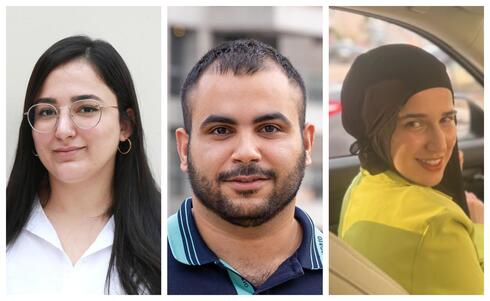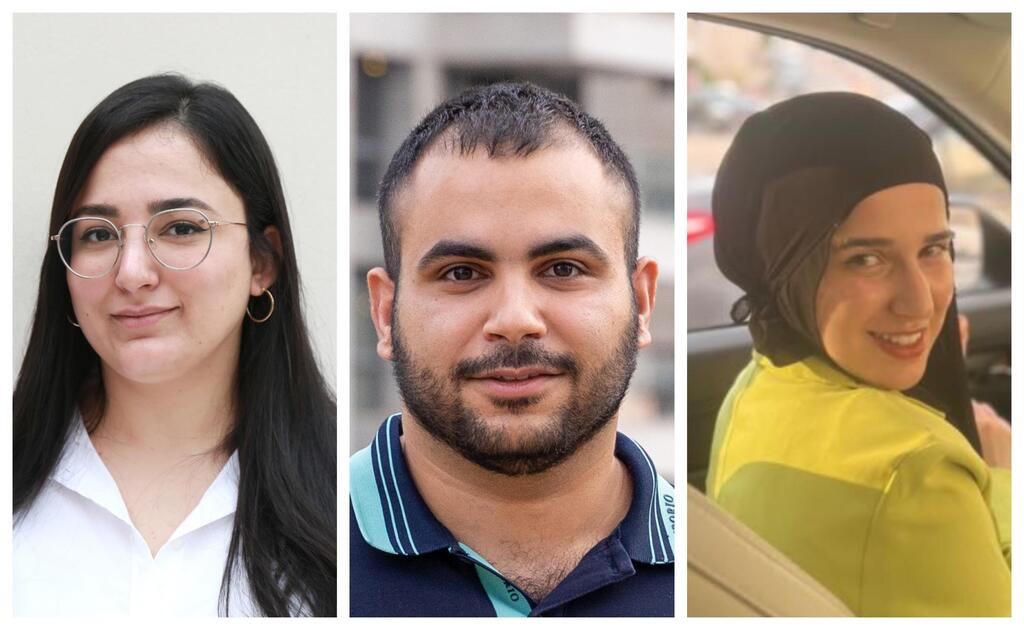
“The Arab community has a significant role to play in the future of Israel’s high-tech industry”
Salma Eyadi, Ahmed Alshafaee, and Saja Jbaly spoke to CTech about the programs that helped members of the Arab community enter Startup Nation - and how the government can continue to support them.
For as long as Israel has nurtured its high-tech scene, there has been criticism on who gets to be members of its gang. Over the years, Startup Nation has been rewarded with great success, but oftentimes scrutinized for its too-white, too-male makeup. While there are government programs to tackle this, some of Israel’s social groups are sometimes sadly left behind: only 3% of the Jewish ultra-Orthodox community is involved in Israel’s high-tech sector, and among Arabs, that number is even lower. While making up 21% of the country’s population, only 0.2% of Israeli Arabs participate in its startup culture (that number rises to 2% when considering 'traditional high-tech').
It’s a trend that needs reversing, if not for the communities then the country as a whole. CTech spoke to three members of Israel’s Arab community who have taken part in programs such as Samana by Portland and A-Tech by Elevation and Atidna (supported by Israel Innovation Authority) to help them achieve their goals. Today, Salma Eyadi is a QA Engineer at SolarEdge, Ahmed Alshafaee is a Full-Stack Developer at Cambium, and Saja Jbaly is a Marketing Specialist and Co-founder of Skillfish Marketing Agency.
Here are their stories.
1 View gallery


Salma Eyadi, Ahmed Alshafaee, and Saja Jbaly
(Photo: Michael Hazan/Courtesy/Elevation)
How did you first hear about your training program and what motivated you to join?
“I was searching for a job after leaving my position as a teacher. I previously lived and worked in the South, but after getting married, I had to move back to the North,” says 28-year-old Salma Eyadi. “Commuting more than six hours daily between the south and north became increasingly challenging. Since finding teaching jobs in the north is quite difficult due to high unemployment among teachers, I came across an advertisement for the Semana program in a teachers' group. The ad seemed promising, and after speaking with Rihan, the CTO of Samana and Bushra, I felt encouraged to give it a try.”
Eyadi is from Arraba and is a mother to a toddler. She currently lives in Tur'an, located in Lower Galilee. She earned her career at SolarEdge through the Samana project, an initiative that integrates Bedouin women from the north of Israel into the tech ecosystem.
Alshafaee is a 27-year-old Full-Stack Developer at Cambium from Rahat. He earned the position after seeking DevOps training at A-Tech, a program designed to provide high-quality training and education to Arab graduates in Israel. “I first heard about the training program from my friends who had recently completed their bachelor's degree in software engineering,” he told CTech. “We were all looking for opportunities to take the first step in the high-tech industry, and they recommended this program as a good starting point. Their positive experience and the program's focus on practical skills motivated me to join.”
Finally, Jbaly is a 23-year-old from Taibe and is now the co-founder of a marketing agency called Skillfish with Zolfa, a friend she had met at A-Tech while taking part in its Digital Marketing program. “My passion for technology and my desire to integrate into this innovative field drove me to take action,” she said.
How smooth was your transition from the training program to working in Israel’s high-tech sector?
“The transition was as smooth as possible,” said Eyadi. “The program included various courses that prepared us for the high-tech sector, such as creating our first LinkedIn profile, interview training, an English course that focuses on the language used in the high-tech world, and guidance on professional dress code. These courses, combined with technical training, helped us enter the sector with ease.”
For Alshafaee, the transition from the DevOps training program to working in the high-tech sector was “both exciting and challenging,” giving him a foundation in the essential tools and practices but applying that knowledge in a real-world environment required adaptation and continuous learning. “At first, it was a bit overwhelming to manage the fast-paced nature of the industry, where new technologies and requirements are constantly emerging,” he said. “However, the hands-on experience and problem-solving skills I developed during the training helped me quickly find my footing and confidently take on tasks in my new role.”
Jbaly agrees that the transition was “relatively smooth, but not without challenges. The good training provided me with a strong foundation, but dealing with the reality of work and the rapid changes was challenging,” she said.
Have you encountered any cultural or social challenges in the workplace? How have you navigated them?
Eyadi: “Yes, I have encountered several cultural and social challenges in the workplace. These include working late hours at the hub and continuing to work from home to ensure assignments are completed to the highest standard. Frequent interactions with male colleagues and late-night commutes from Herzliya are not socially acceptable and working from the Hub solved this obstacle. Additionally, there are times when work demands extend into the weekends, which I willingly take on to deliver the best results. To navigate these challenges, I focus on balancing my work and personal life and managing my time effectively.”
Alshafaee: “Yes, I have encountered some cultural and social challenges in the workplace, particularly related to communication styles and expectations. In Israeli tech culture, communication tends to be very direct, and there is a strong emphasis on quick decision-making and voicing opinions openly, which was different from what I was initially used to. It took some time to adapt to this straightforward approach and to feel comfortable expressing my ideas confidently in a fast-paced environment.”
To navigate these challenges, he made an effort to observe and learn from colleagues, while also improving his Hebrew and English skills to communicate more effectively. “Building relationships and finding common ground with my team members helped me feel more integrated. Additionally, being open to feedback and willing to ask questions played a significant role in overcoming any cultural barriers and enhancing my collaboration with others,” he said. Jbaly also navigated the same challenges “through openness, clear communication, and a willingness to learn and adapt to different environments.”
What advice would you give to other Arabs considering a similar path in the high-tech field?
Eyadi says that Arabs considering a career in the high-tech sector should remain open to continuous learning and stay open to learning something new. “It’s important to seek out programs and opportunities that offer targeted training. Also building a strong network can be helpful, as it provides support and opens doors to new opportunities,” she said. “Additionally, be prepared to face and overcome challenges and take every failure as a chance to learn and get better.”
“My advice is to stay focused on your goals and be persistent, even when facing challenges,” adds Alshafaee. “It’s important to constantly improve your technical skills, build a professional network, and learn from those around you. Mastering Hebrew and English will be very helpful, and it’s also important to be proactive, ask questions, and express your opinions with confidence. Additionally, seek support from mentors or people who have walked a similar path, as they can provide valuable guidance. Believe in yourself and don’t let any barriers stop you from progressing in the high-tech sector.”
Jbaly suggests investing in deep learning and understanding of the high-tech field. “Take advantage of opportunities to gain practical experience and build professional connections with industry professionals.”
How can the high-tech industry better engage and support the Arab workforce?
For Eyadi, Startup Nation can help Arab workers by hiring more from its community and providing mentorship and opportunities for career advancement. “Creating work environments that are supportive and understanding of cultural differences can also be helpful and offering training and resources that are specified to their needs will help them feel more included and supported and give them more confidence to join the industry,” she said.
Alshafaee also adds that the high-tech industry can support the Arab workforce by creating targeted mentorship and training programs, partnering with Arab educational institutions, and ensuring an inclusive environment that values diversity. “It’s important to promote focused recruitment from the Arab community and offer equal opportunities for professional growth and advancement,” he said.
Jbaly said Israel’s high-tech industry can “promote equal opportunities, offer tailored training programs just like A-Tech for diverse groups, and create inclusive and welcoming work environments that support various social and cultural groups.”
Did you face any barriers or challenges in securing your first job in the sector?
Eyadi: “With the support we received, I didn’t face significant challenges… From the beginning, I aimed to work at SolarEdge, and the program’s preparation aligned with the company’s requirements. During the training, we had the opportunity to present various projects to SolarEdge's team leaders and VP, showcasing our progress. This process led to an interview and ultimately helped me secure my first job.”
Alshafaee confirms that there were, in his case, some barriers and challenges in securing his first high-tech job. “The most significant challenge was the competitive job market, where many candidates with more experience were applying for the same entry-level positions,” he explained. “Additionally, many companies preferred candidates who had hands-on experience in real-world projects, which is something I had to emphasize from my training rather than actual job experience. Another hurdle was adjusting my interview skills to meet the expectations of technical interviews, which often involved solving complex coding and infrastructure problems on the spot. Overcoming these challenges required persistence, refining my skills, and leveraging networking opportunities to eventually land my first role.”
“Yes, I encountered challenges such as high competition in the job market and the need to prove myself quickly, but improving my interpersonal skills in working with clients helped me develop my career in the right direction,” added Jbaly.
What role do you think the Arab community can play in the future of Israel's high-tech industry?
“The Arab community can have a big impact on Israel's high-tech industry by contributing fresh ideas and different perspectives,” concluded Eyadi. “As more people from the community get involved in the industry, they can drive innovation and help create a more diverse and inclusive industry, it can also help fill gaps and strengthen the industry overall.”
“I believe the Arab community has a significant role to play in the future of Israel’s high-tech industry,” said Alshafaee. “As more Arab professionals enter the sector, they bring diverse perspectives, creativity, and talent that can drive innovation. Additionally, increasing the representation of Arabs in high-tech can help bridge cultural gaps and promote inclusivity, which benefits both the community and the industry as a whole. With the right support, education, and opportunities, the Arab community can contribute to shaping the next generation of technology in Israel and help create a more diverse and dynamic workforce.”
“The Arab community can contribute a wide range of perspectives, innovative solutions, and unique technological capabilities, and be a significant player in the culture of innovation and growth in the industry,” concluded Jbaly.














